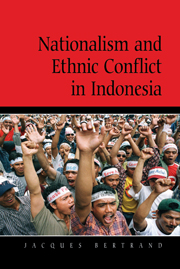Book contents
- Frontmatter
- Contents
- List of figures and tables
- Preface
- Maps
- 1 Introduction
- 2 Critical junctures, nationalism, and ethnic violence
- 3 The national model and its institutional history
- 4 Exclusion, marginality, and the nation
- 5 Islam and nation: The Muslim–Christian dimension
- 6 The escalation of religious conflict
- 7 Conflict in Maluku
- 8 Late integration into the nation: East Timor and Irian Jaya (Papua)
- 9 Aceh's ethnonationalist conflict
- 10 Autonomy as a solution to ethnic conflict
- 11 Unity in diversity
- Notes
- Glossary
- Bibliography
- Index
- CAMBRIDGE ASIA–PACIFIC STUDIES
5 - Islam and nation: The Muslim–Christian dimension
Published online by Cambridge University Press: 10 December 2009
- Frontmatter
- Contents
- List of figures and tables
- Preface
- Maps
- 1 Introduction
- 2 Critical junctures, nationalism, and ethnic violence
- 3 The national model and its institutional history
- 4 Exclusion, marginality, and the nation
- 5 Islam and nation: The Muslim–Christian dimension
- 6 The escalation of religious conflict
- 7 Conflict in Maluku
- 8 Late integration into the nation: East Timor and Irian Jaya (Papua)
- 9 Aceh's ethnonationalist conflict
- 10 Autonomy as a solution to ethnic conflict
- 11 Unity in diversity
- Notes
- Glossary
- Bibliography
- Index
- CAMBRIDGE ASIA–PACIFIC STUDIES
Summary
During the New Order period, religious identity emerged as the most important form of ethnic identification. The Suharto government increased the use of state instruments to repress Islamic demands and contain religious conflict. Yet, these policies ironically contributed to a reinforcement of religious identities. Over the three decades of Suharto's rule, identities as Muslim or Christian intensified, leading to greater demands for protection and recognition of their respective communities.
The question of an Islamic state had been one of the most important challenges to the nationalist vision of Indonesia. Rejection of the Jakarta Charter at the time of independence had not been well received by Muslim groups that had supported the Republic. The first critical juncture had ended with an ambiguous role for Islam in the polity: the question was left open-ended and subject to renegotiation during discussions for a final constitution. The Darul Islam movement followed the path of armed rebellion to promote an Islamic state. Other political organizations, such as the Islamic party Masyumi, chose to adhere to established political processes to further an Islamic agenda. Islamic parties failed to obtain strong support in the 1955 elections but subsequently wielded considerable power in the Constituent Assembly that was formed to negotiate the new constitution. They prevented the assembly from reaching a compromise that excluded Islam as a state ideology and negotiations were stalled as a result.
When regional rebellions arose in the late 1950s, several of them joined the Darul Islam.
- Type
- Chapter
- Information
- Nationalism and Ethnic Conflict in Indonesia , pp. 72 - 89Publisher: Cambridge University PressPrint publication year: 2003



